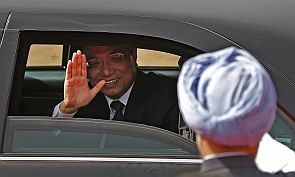 Why is China resiling from the 2005 pact on settled populations, and well-defined features, asks Delhi. Jyoti Malhotra reports
Why is China resiling from the 2005 pact on settled populations, and well-defined features, asks Delhi. Jyoti Malhotra reports
Chinese Premier Li Keqiang arrived in Delhi on Sunday afternoon on the first leg of his maiden trip abroad as prime minister, as both countries readied to talk about improving peace and tranquillity across the 4,000-km Line of Actual Control.
India is likely to propose an exchange of maps on the contested western and eastern sectors across the LAC, when Prime Minister Manmohan Singh meets his Chinese counterpart over an informal dinner on Sunday night, as well as during formal talks on Monday.
According to government sources, the Indian side will "proactively" raise the importance of greater information-sharing on trans-border rivers such as the Brahmaputra-Yarlung Tsangpo, and hope China, as an upper riparian state, will fulfil its responsibilities. Market access for Indian companies in China is a third item on the prime minister's agenda.
Under the aegis of the Federation of Indian Chambers of Commerce and Industry, the India-China CEO Forum, co-chaired by Reliance Group's Anil Ambani, is meeting on Monday to take forward the idea of greater market access for India in China and bigger Chinese investment in India.
In the wake of the recent Depsang incident, which saw bilateral relations take a hit after Chinese troops intruded into the Indian side on April 15, the Chinese media had talked of the pressing need to settle the boundary, which Indian government officials say they are "fully ready" to do.
In Delhi, a variety of conversations with Indian government officials indicated that the government doesn't seem to be still fully sure how and why the Depsang incident occurred on April 15, especially since the Chinese had proposed the visit of Li to India only 10 days before.
Whatever the motive, Indian officials intelligently used the accompanying furore in the national media to send a message to the Chinese that the visit of premier Li would be called off if the border incident was not resolved at the earliest.
Interestingly, Depsang could force the Chinese to come back to the "political parameters and guiding principles" that were arrived at between the Indian and Chinese special representatives J N Dixit and Dai Bingguo, respectively, in 2005.
According to top-level government sources, the Indian and Chinese side agreed to two major principles that would define the framework of a future boundary settlement.
First, settled populations in both countries would not be disturbed. This was a reference to people in Arunachal Pradesh and especially in Tawang, which China claims because it was the birthplace of the sixth Dalai Lama, and in the Chinese mind, all the Dalai Lamas in the past, present and future must pay obeisance to Beijing.
The second principle was to settle the boundary according to "well-defined features", which has since become a contested phrase between the two sides.
The Indians have thought this to mean the watershed principle of hills and valleys, while the Chinese want to derive maximum territorial gain from it. The Indian side seems willing to live by the "status quo" on the border, which means China and India keep the territory they have today on an as-is-where-is basis, with some give-and-take involved.
This would mean China would more or less keep the territory of Aksai Chin in the Western sector, which it controls, and India would keep Arunachal Pradesh. The question is if India is willing to go through with its own commitment to the 2005 "guiding principles" today, which is to say that the map of India will change -- India will lose Aksai Chin -- if those principles are implemented.
Under the circumstances, the conversations between Prime Minister Singh and Premier Li on the border issue could be one of the most important in recent times.
Picture: Chinese Premier Li Keqiang waves as Prime Minister Manmohan Singh watches after Li's ceremonial reception at the forecourt of Rashtrapati Bhavan in New Delhi
Photographer: Adnan Abidi/Reuters











